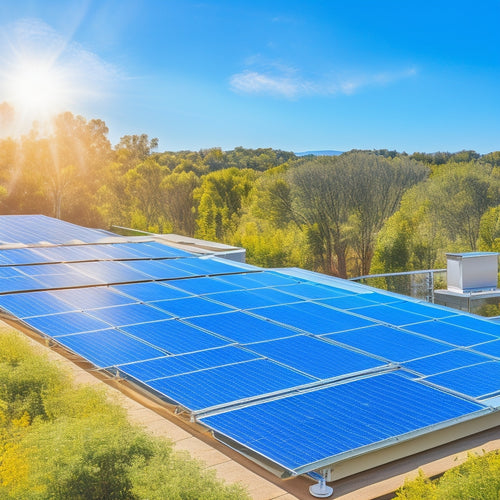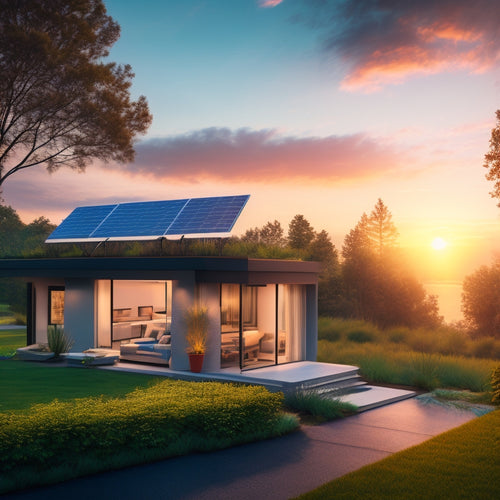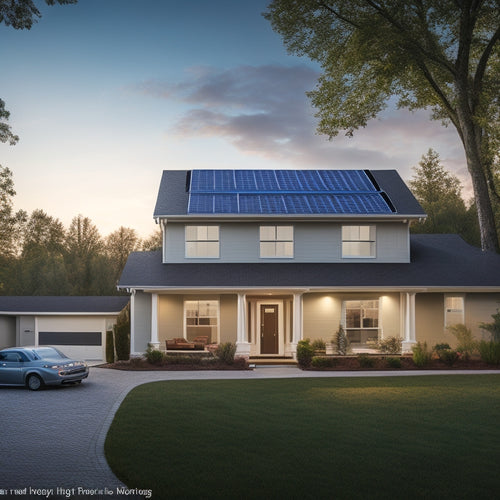
Boosting Home Energy Efficiency With These Solutions
Share
Enhancing your home's energy efficiency starts with strategic upgrades, like improved insulation and energy-efficient appliances. These solutions cut heating and cooling costs while lowering your utility bills over time. Incorporating smart technology can further optimize your energy use, ensuring you manage consumption effectively. Not only do these investments enhance your home's comfort, but they also greatly increase its market value. By making eco-friendly choices, you gain long-term financial benefits and contribute to a sustainable environment. Embracing these innovations will set you on a path to more savings and smarter living, and there's plenty more to investigate.
At a Glance
- Upgrade insulation with materials like spray foam or fiberglass to significantly reduce heating and cooling costs while enhancing home comfort.
- Invest in energy-efficient appliances that lower utility bills and promote sustainable living through reduced energy consumption.
- Implement smart technology, such as smart thermostats, to optimize energy use and improve overall energy management.
- Consider solar panels or renewable energy sources to decrease reliance on non-renewable resources and achieve substantial long-term savings.
- Conduct energy audits to identify specific improvement areas, ensuring targeted upgrades for maximum efficiency and return on investment.
Cost-Effective Energy Savings
When you consider cost-effective energy savings, insulation upgrades and energy-efficient appliances should be at the top of your list.
By improving your home's insulation, you reduce heating and cooling costs greatly, while energy-efficient appliances cut down on your utility bills over time.
Additionally, integrating smart technology aids in managing energy consumption can further enhance savings.
Investing in these solutions not only enhances your comfort but also provides long-term financial benefits.
Insulation Upgrades
Upgrading insulation is one of the most effective ways to enhance your home's energy efficiency while reducing utility bills. By investing in better insulation materials, you can create a more comfortable living environment and gain control over your energy usage.
Options like spray foam, fiberglass, and cellulose are popular for their unique properties and benefits. For instance, spray foam provides excellent air sealing, while fiberglass offers cost-effective thermal resistance.
However, it's not just about the materials you choose; installation techniques are equally critical. Properly installed insulation can greatly reduce air leaks, which are often responsible for energy loss. You might consider hiring professionals for complex installations, especially in hard-to-reach areas.
If you're a DIY enthusiast, make sure you follow best practices to maximize performance.
Ultimately, upgrading your insulation is a smart, long-term investment. It not only enhances your home's energy efficiency but also enables you to take charge of your energy costs.
Energy-Efficient Appliances
Improving your home's energy efficiency doesn't stop with insulation; energy-efficient appliances play a significant role in reducing overall energy consumption and lowering utility bills. By choosing appliances equipped with smart technology, you can optimize energy use and gain better control over your home's energy management. Look for appliance labels that indicate energy efficiency ratings, as they provide important understanding into potential savings.
Here's a simple breakdown of common energy-efficient appliances and their benefits:
| Appliance | Energy-Saving Feature | Estimated Savings |
|---|---|---|
| Refrigerator | LED lighting, efficient compressors | Up to $200/year |
| Washing Machine | High-efficiency settings | Up to $100/year |
| Dishwasher | Smart sensors for water use | Up to $80/year |
| Oven | Convection features | Up to $50/year |
Investing in these appliances not only reduces your energy bills, but it also contributes to a more sustainable lifestyle. By making informed choices, you can enjoy the freedom that comes with lower utility costs while promoting a healthier planet. Accept the shift to energy-efficient appliances today!
Long-Term Financial Savings
Investing in energy efficiency not only slashes your utility bills but also elevates your property's market value.
By installing solar panels, you can reduce energy costs by 50-75%, resulting in substantial annual savings. As you implement these solutions, you'll see significant savings over time, making your home more appealing to potential buyers.
Additionally, financial incentives such as tax credits and rebates can further enhance your return on investment, making solar energy an attractive option for homeowners looking to maximize their savings financial incentives for solar panels.
Reduced Utility Bills
By taking steps to enhance your home's energy efficiency, you can greatly reduce your utility bills over time. Implementing smart thermostats is one of the most effective strategies. These devices learn your schedule and preferences, allowing you to optimize heating and cooling without sacrificing comfort. You can set them to lower energy usage when you're away, ensuring you're not wasting money on unnecessary heating or cooling.
Incorporating home automation into your energy management further amplifies these savings. By synchronizing your smart devices, you can create an energy-efficient ecosystem that operates seamlessly. For example, smart lighting can adjust based on natural daylight, minimizing electricity usage during the day.
Investing in energy-efficient appliances also contributes to long-term financial savings. While the initial cost might seem intimidating, the cumulative savings on your utility bills can be significant. Fundamentally, these upgrades not only enhance your comfort but also grant you the freedom to manage your energy consumption proactively.
In the long run, reducing your utility bills gives you more financial flexibility, allowing you to allocate your hard-earned money to experiences and investments that matter most to you.
Increased Property Value
Energy-efficient upgrades can greatly enhance your property's value, making it a smart choice for homeowners. When you invest in energy-efficient solutions, you elevate your property's appeal in a competitive market. Buyers today prioritize sustainability, which translates to higher market demand for homes that feature eco-friendly upgrades.
Consider this: prospective buyers often view energy-efficient homes as a long-term investment. They recognize the potential for reduced utility bills and a smaller carbon footprint, which adds to your property's desirability. Features like solar panels, energy-efficient windows, and modern insulation not only enhance comfort but also signal to buyers that they're making a wise financial choice.
Moreover, as energy prices continue to rise, homes with energy-efficient systems become increasingly attractive. You're not just improving your home; you're positioning it for future market trends.
Essentially, energy efficiency isn't just about saving money today; it's about increasing your property's value for tomorrow.
Key Benefits Overview
When you consider home energy efficiency solutions, it's clear that the benefits extend beyond just your wallet.
You can greatly lower your energy bills while also making a positive impact on the environment.
Cost Savings Potential
Considering the rising costs of utilities, homeowners are increasingly seeking ways to enhance their financial well-being through energy efficiency solutions. By conducting energy audits, you can identify areas where your home wastes energy and make informed decisions about improvements. Small behavioral changes can also lead to significant savings, like adjusting thermostat settings or using energy-efficient appliances.
Here's a breakdown of potential cost savings:
| Solution | Initial Investment | Annual Savings |
|---|---|---|
| Energy Audits | $200 - $500 | $200 - $600 |
| Insulation Upgrades | $1,000 - $3,000 | $300 - $800 |
| Smart Thermostats | $100 - $250 | $100 - $200 |
Implementing these solutions can result in substantial yearly savings. Over time, the initial investments you make can pay off, freeing up resources for other pursuits. Embracing energy efficiency isn't just about saving money; it's about gaining control over your expenses and making choices that align with your values. The path to financial freedom starts with informed decisions that lead to lasting change. Take charge of your energy use today!
Environmental Impact Reduction
Implementing energy efficiency solutions not only saves you money but also plays an essential role in reducing your home's environmental impact. By adopting sustainable practices, you can considerably lower your carbon footprint, contributing to a healthier planet. Each energy-efficient upgrade, from installing LED lighting to enhancing insulation, reduces greenhouse gas emissions, making a positive difference.
You mightn't realize it, but every choice you make in your home affects the environment. By optimizing energy usage, you're not just conserving resources; you're actively participating in a broader movement for sustainability. Using smart thermostats, for example, allows you to regulate your energy consumption more effectively, ensuring you're not wasting power when you don't need it.
Moreover, energy-efficient appliances often have a longer lifespan, reducing the need for replacements and the waste that comes with them. This comprehensive approach not only enhances your quality of life but also enables you to live in harmony with the environment.
Embracing these solutions isn't just a personal benefit; it aligns you with a global effort to promote sustainable living and reduce the collective carbon footprint. Take action today—your choices can lead to a cleaner, greener future.
Selecting Based on Energy Source
When selecting energy solutions for your home, it's essential to reflect on the source of your energy. Renewable options like solar and wind can greatly reduce your carbon footprint, while traditional sources may offer more immediate availability.
Implementing renewable energy solutions can lead to long-term savings and a more sustainable lifestyle, reinforcing the importance of empowering homes with renewable energy.
Renewable Energy Options
A multitude of renewable energy options can greatly enhance your home's energy efficiency while reducing your carbon footprint. By utilizing natural sources like sunlight and wind, you can gain independence from traditional energy systems and potentially lower your utility bills.
Solar panels are one of the most popular choices. They convert sunlight into electricity, providing a clean and sustainable energy source. Plus, many regions offer incentives for solar installation, making it a financially savvy investment.
When you install solar panels, you're not just generating energy; you're also increasing your property's value.
Wind turbines are another viable option, especially if you live in an area with consistent wind patterns. A small residential wind turbine can supply a significant amount of energy, further decreasing your reliance on fossil fuels.
While the initial costs may seem high, the long-term savings and environmental benefits can be substantial.
Traditional Energy Sources
Selecting the right traditional energy source for your home can greatly impact both your energy costs and environmental footprint. While many homeowners opt for fossil fuels due to their availability and established infrastructure, it's vital to weigh their long-term effects on both your wallet and the planet.
Here's a quick comparison of common traditional energy sources:
| Energy Source | Pros | Cons |
|---|---|---|
| Natural Gas | Lower emissions than coal | Still a fossil fuel, price volatility |
| Coal | Abundant and cost-effective | High emissions, environmental damage |
| Oil | High energy density | Price fluctuations, pollution |
| LPG (Propane) | Versatile, cleaner than coal | Higher cost, limited availability |
| Biomass | Renewable option, reduces waste | Can still contribute to emissions |
Higher Return on Investment
When you invest in energy-efficient upgrades, you're not just making your home more comfortable; you're also enhancing its value.
These improvements often lead to significant savings on your utility bills, which translates to a higher return on investment over time.
Energy-Efficient Upgrades Pay off
Investing in energy-efficient upgrades often leads to significant long-term savings and enhanced property value. By integrating smart home technology, you can monitor and control energy consumption more effectively. This means you're not just reducing your energy bills; you're also creating a more comfortable living environment.
Conducting energy audits is an essential first step. These assessments help identify areas where your home can improve its efficiency. You'll uncover the best investments for your specific situation, whether that's upgrading insulation, installing energy-efficient windows, or investing in high-efficiency appliances.
Each upgrade not only lowers your monthly expenses but can also yield a higher return on investment when it's time to sell your home.
Moreover, as energy costs continue to rise, potential buyers are increasingly looking for homes with energy-efficient features. By making these upgrades, you're not only enhancing your quality of life but also positioning your property as a smart investment in a competitive market.
Ultimately, energy-efficient upgrades enable you to take control of your energy use, leading to financial freedom and peace of mind. Make the choice today to enhance your home's efficiency and reap the rewards for years to come.
Frequently Asked Questions
What Simple Habits Can Improve Home Energy Efficiency Daily?
You can improve your home's energy efficiency daily by adjusting thermostat settings to match your schedule and optimizing appliance usage. Simple changes like these not only save energy but also reduce your utility bills considerably.
How Does Home Energy Efficiency Impact Indoor Air Quality?
Home energy efficiency greatly impacts indoor air quality. Proper ventilation systems and effective air filtration help reduce pollutants, ensuring you breathe cleaner air. This not only enhances comfort but also promotes overall health and well-being in your space.
Are There Government Incentives for Energy-Efficient Home Upgrades?
You'll find that many government incentives, like tax credits and rebate programs, are available for energy-efficient home upgrades. These financial benefits not only lessen your upfront costs but also enable you to improve your living environment.
What Role Does Landscaping Play in Energy Efficiency?
Landscaping greatly impacts energy efficiency. Thoughtful terrain design, with shade trees and windbreak plants, enhances outdoor insulation. Incorporating native vegetation and a strategic garden layout can reduce heating and cooling costs, promoting freedom from high energy bills.
How Can I Measure My Home's Energy Efficiency?
To measure your home's energy efficiency, conduct energy audits and compare results against efficiency benchmarks. This analysis reveals areas for improvement, helping you make informed decisions that enhance comfort and reduce costs while enjoying your freedom.
Explore More
Incorporating energy-efficient solutions isn't just smart—it's essential. Did you know that homes can save up to 30% on energy bills with the right upgrades? This statistic highlights the potential for significant savings while reducing your carbon footprint. By selecting improvements based on your energy source and focusing on cost-effective options, you can maximize your return on investment. Adopt these changes today, and you'll not only enhance your home's efficiency but also contribute to a more sustainable future.
Related Posts
-

What Types of Solar Energy Devices Are Available
You'll find several types of solar energy devices available today, each customized to different energy needs. Photovo...
-

The Future of Residential Energy Storage
The future of residential energy storage looks promising and cost-effective for you. With lithium-ion battery prices ...
-

Cost of Solar With Battery Backup
You're investing in a solar panel system with battery backup to guarantee reliable power during outages. The cost of ...


